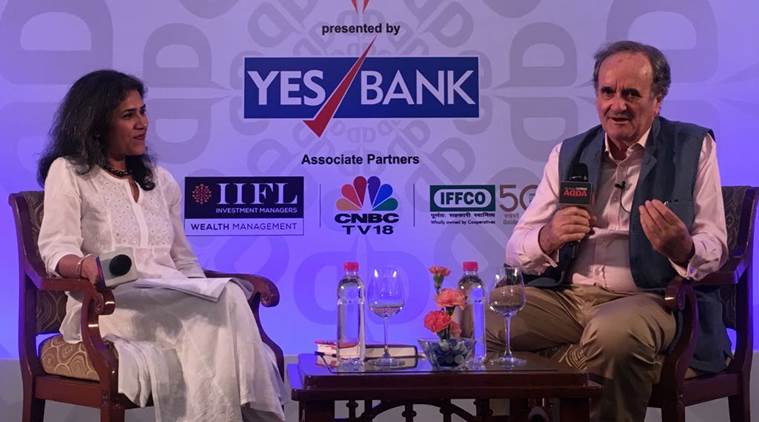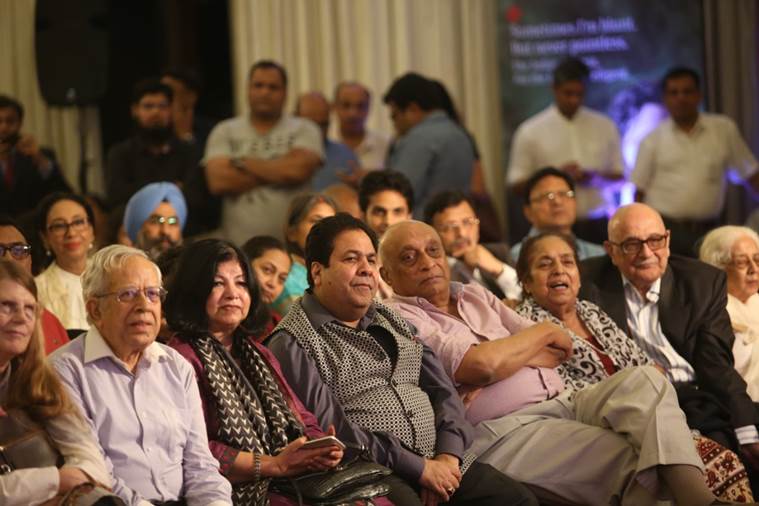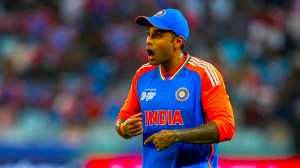Stay updated with the latest - Click here to follow us on Instagram
Congress must find space for religion, says Mark Tully
Mark Tully said political leaders who do not engage with the press are failing in their duty, and anyone who tries to control the media in today’s age is “making a huge mistake”.
 Mark Tully at the Express Adda in New Delhi. (Source: Express Photo/Neeraj Priyadarshi)
Mark Tully at the Express Adda in New Delhi. (Source: Express Photo/Neeraj Priyadarshi)
Veteran journalist Mark Tully has suggested that the Congress party should consider looking at the Gandhian model of nationalism to revive itself, and must find a place for religion in its politics. Speaking at the Express Adda Saturday, Tully, who has seen the Congress evolve from the time before Indira Gandhi took over its leadership, said that the party’s leaders need to revive its ideology and state what it stands for.
“The Congress should find a place for religion” in what the party stands for, said Tully. When the Congress talks about secularism it gives the impression that they are “anti-religion” while “most Indians are religious”, he said. Suggesting that the party should look at “a nationalism with a religious colouring to it, which was a multi-faith religious colouring to it,” he said that according to Congress and its supporters today, “if you say anything about Hinduism, if you say anything about religion, you are RSS”.
Tully, who reported from India for the BBC said that India also needed an “independent public service broadcaster”, which was the idea behind Prasar Bharati when it was set up. But Prasar Bharati “is not doing that job”, he said. In his soft, understated style, Tully also spoke about Indian politicians and the press. He said that political leaders who do not engage with the press are failing in their duty, and anyone who tries to control the media in today’s age is “making a huge mistake”.
Responding to a question about top politicians, including Narendra Modi and Donald Trump, bypassing the traditional interface with the press and using Twitter to inform the public, Tully said he felt this “idea of putting all the news on Twitter” was extraordinary, and “just sounds all wrong”.
 Guests at the Express Adda with Mark Tully, New Delhi. Express Photo by Praveen Khanna
Guests at the Express Adda with Mark Tully, New Delhi. Express Photo by Praveen Khanna
Any politician, Tully said, “who is reluctant to face the press is failing in his duty, because the press is an essential part of this whole democratic setup, and the press should be enabled to do its job, and that job includes questioning politicians”. The absence of credible news gives birth to rumour and false news, Tully stressed.
When former prime minister Indira Gandhi was shot dead the first reports were put out by the BBC. Tully recalled that he was in Mussoorie when he heard two policemen talk about Gandhi’s death. By the time he came back to Delhi, his colleague Satish Jacob had gone to the hospital where Gandhi was taken and had confirmed the news, thus scooping the world, including the Indian press.
Tully also recalled that when Mulayam Singh Yadav, then chief minister of Uttar Pradesh, ordered police to open fire on Kar Sevaks gathered in Ayodhya on October 30, 1990, an evening paper ran a news story that over a 100 people had died in the shootings, attributing the toll to BBC. The news could have vitiated the tense atmosphere further, and Tully got a call from George Fernandes who had just come out of a Union Cabinet Meeting. “What the hell have you done?” Fernandes asked, says Tully, to which he responded that BBC had not broadcast any such news.
“Anyone who tries to control the media is making a huge mistake because in the end they will be hit by rumour, which is now of course an even more powerful weapon because (on) the social media rumour spreads like a disease, literally,” said Tully.
Tully said that there is a need for more news and more balanced news. He, too, has been a victim of false news, with dispatches on Sonia Gandhi and Narendra Modi that he did not write getting publicised in his name, he said. After one such instance, a BJP Cabinet minister, who is “now the vice president”, called him to enquire about it. Tully told him that he had already reported it to the government and asked what else could be done. According to Tully, the politician responded, “Yes, we have our own trouble with fake news.”
Regaling the audience with anecdotes from his meetings with leaders like Indira Gandhi, Pakistan General Zia Ul Haq — whom Tully disliked, and vice versa — and Morarji Desai, among others, Tully said that Devi Lal and Charan Singh were two politicians he was “very, very fond of”.
He said the Janata Dal and the Janata movement should have survived, and that their leaders have forgotten their socialist roots today. It has become too much of a casteist movement and the leaders so argumentative that they can’t get along with each other, he said.
Another important issue that Tully spoke about was India’s ambition to be a superpower and find a permanent seat on the United Nations Security Council. He said that he strongly believes “Mahatma Gandhi would be horrified at the thought of India wanting to be a superpower”.
He said India’s ambitions must be different, and that it should be a country “where all its citizens prosper, where all its citizens continue to enjoy freedom, and a country very importantly which sets an example to the world because… its tradition of multi-religious tolerance is flourishing”.
SEE PHOTOS | Sir Mark Tully at Express Adda
He said India is one country that could be an example to the world that such a society can work. “But the idea of India being a super power, the idea of India finding a seat on the security council I think is setting your priorities completely wrongly,” he said. Almost as an afterthought, Tully said with a smile, “A lot of people will say Mark Tully wants to stop India becoming a superpower. Maybe I do.”
One of the most respected international journalists who has reported on India for over 50 years, Tully spoke for about an hour and 15 minutes on a variety of topics and of his experiences from reporting on politics in the subcontinent starting in the mid-1960s. The discussion was scattered with several anecdotes of his interactions with some of the top politicians of the subcontinent, few of whom he liked and a few he didn’t.
At the Adda, Tully was in conversation with The Indian Express’s Deputy Editor Seema Chishti. Guests at the event in the past include the Dalai Lama, economist and Nobel laureate Amartya Sen, Union Minister Nitin Gadkari, Chief Economic Advisor Arvind Subramanian, filmmaker Karan Johar, Union Minister Piyush Goyal, Punjab Chief Minister Amarinder Singh, writer Amitav Ghosh and cricketer Virat Kohli.







